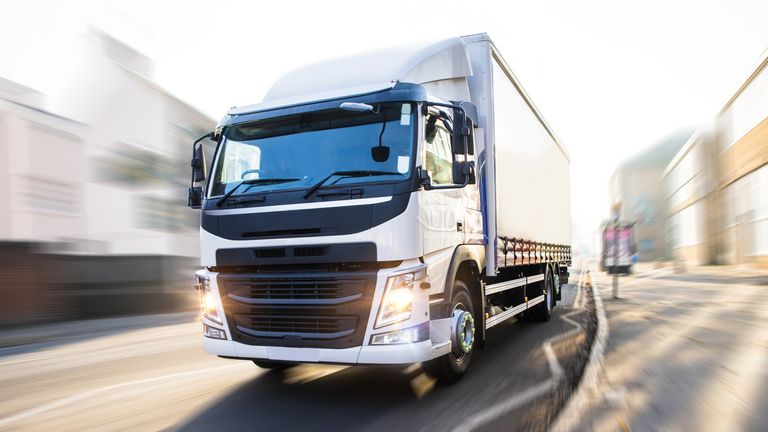Government plans to change how frequently overseas HGV operators can deliver in the UK will “undercut” British operators and drivers, a haulage group has told Sky News.
A consultation on extending “cabotage” rights has been launched, in a bid to try to shore up supply chains and prevent shops running out of goods or increasing prices due to an HGV driver shortage.
But Rod McKenzie, managing director of policy and public affairs of the Road Haulage Association, criticised the “short-term” and “populist” move.
Will the UK have a winter crisis?“I’ve been talking to our members and they’ve been using words like ‘gobsmacked’ and ‘appalling’,” he told Sky’s Kay Burley.
“In essence it is because of this: the government have been saying for a while now that they want a high wage, high skill economy and they don’t want to pull the lever marked ‘uncontrolled immigration’.
Advertisement“To them [UK drivers], it looks like they’ve just done that.
“Allowing foreign hauliers who charge low rates and the lorry drivers who get very small pay packets to come in and undercut the work that could be done within the UK by British haulage firms.
More on Hgv Drivers Related Topics: hgv driverssupply crisis“It horrifies British haulage firms at a time when they’re facing increased costs and they’re putting up wages for their drivers, quite rightly, and now they’re being undercut by this move, which flies in the face of reason.”
Mr McKenzie said the move “won’t solve all the Christmas delivery problems” but will “make a difference” for the supermarket sector.
Cabotage are the rules around goods or passenger transport in a country by a transport operator from a different country.
Why is there an HGV driver shortage and how bad could the problem get?
Currently, the rules mean HGV drivers from the EU can only make up to two trips between two places in the UK within a week. But the new plan would allow overseas operators to collect and deliver goods an unlimited number of times over a fortnight before they return to their country of origin.
If the proposal is approved after the week-long consultation, the change would come into force before the end of the year and last for six months.
Transport Secretary Grant Shapps told Sky News that the policy would mean “the equivalent of adding thousands of lorry drivers to the road, but we don’t have to do anything with visas in order to do this”.
Speaking to Kay Burley, he added: “It’s a straightforward measure, it’ll come in towards the end of the year.
“People will be able to get things for Christmas – these measures are having an impact, things are loosening up.
“When I talk to ports they’re saying ‘yes, it is busy, it’s a globally busy picture’, but if you compare us to many ports around the world, we need to keep this in proportion – things are flowing.”
Follow the Daily podcast on Apple Podcasts, Google Podcasts, Spotify, Spreaker
Labour’s shadow transport secretary said ministers are “bumbling from one delayed reaction to another – a direct result of their failure to properly plan to make Brexit work.”
He added: “Meanwhile, British people are paying the price for their incompetence and face another potentially ruined Christmas thanks to Boris Johnson’s refusal to acknowledge the scale of the winter crisis we are facing.”
The government said the changes would apply to all types of goods but would be “particularly beneficial” to food supply chains and imports arriving from ports.
Retailers have warned the ongoing supply chain problems will result in higher prices and empty shelves for Christmas.
Shipping company Maersk has diverted vessels away from Felixstowe due to a build-up of cargo, and similar blockages have been seen around the world, including in the US.
Image: Shipping giant Maersk has said it is diverting vessels away from Felixstowe due to the build-up of cargoMr Shapps said supply chain issues are an international problem but are being handled resiliently in the UK and “we shouldn’t report ourselves into a crisis”.
“We know that the globe has woken up after coronavirus with huge supply chain issues everywhere around the entire world,” the transport secretary said.
“In this country we have taken 24, now 25, different steps on the domestic side of that – the lorry drivers side of things – and we’re seeing it have a big impact.
“We’ve got now three times as many people applying to become lorry drivers every single day than before the crisis.
“We have to be careful, we mustn’t report ourselves into a crisis.”
